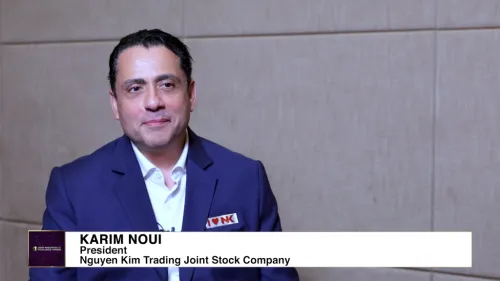
Constant innovation with technology crucial in current fast-paced business environment – Peter Eckert, Partner, Consulting at Ernst & Young Advisory Pte. Ltd.
Building a trustworthy consumer experience requires a comprehensive strategy that balances long-term objectives with short-term actionable goals.
In today's dynamic and competitive business landscape, the significance of brand experience cannot be overstated. It's the cornerstone of building trust, fostering loyalty, and engaging customers on multiple levels, whether functional, emotional, or aspirational.
Peter Eckert, a Partner in Consulting at Ernst & Young Advisory Pte. Ltd., and judge at the Asian Experience Awards, shared his insights and shed light on the ever-evolving realm of brand experience, its critical role in the Asia Pacific region, and how companies can navigate this exciting landscape.
Eckert leads innovation and experience design consulting at Ernst & Young Advisory Pte. Ltd. in Singapore. He supports ASEAN countries with experience-led strategy and delivery services. With a global perspective honed through collaborations with numerous Fortune 500 companies, Eckert is a trusted advisor when it comes to implementing customer experience strategies. His expertise lies in reshaping the way products and services are envisioned, designed, built, and marketed.
When asked about the role of innovation and technology in enhancing brand experiences, Eckert emphasised the paramount importance of constant innovation. In today's fast-paced business environment, companies must continuously seek ways to improve and innovate. Technology, according to him, serves as the enabler of innovation strategies.
How do you define a meaningful brand experience, and what elements do you believe are essential for creating such experiences?
Brand experience, or customer experience (CX), is the exchange or the relationship between a person and a business. A meaningful brand experience helps to build trust and loyalty and engages the customer on multiple levels, such as functional, emotional, and aspirational. To create a meaningful brand experience, all touch points matter. Today, the sum of all your experiences is your brand, and ignoring the brand experiences you offer can hurt your customer and growth strategies. Conversely, companies have an opportunity for growth if they listen to customers and meet and exceed their brand experience expectations.
What role do you think innovation and technology play in enhancing brand experiences, and how can companies effectively leverage them?
In a fast-paced business environment, constant innovation is key. Businesses must find ways to improve and be innovative about it. Technology is the enabler of a product or service innovation strategy, where data application can help retailers and brands orchestrate the implementation of the entire brand experience for the customer. For brands and retailers, data integration should be the first investment if they are looking beyond top- and bottom-line impacts. A deep understanding of the interdependencies of enterprise data is vital to aligning an organisation’s sales and marketing thesis with its growth commitments.
Creating a trustworthy consumer experience requires a strategy that prioritises both a long-term focus and short-term actionable goals, accounting for capital, talent, inventory, consumer expectations, and loyalty. The brand experience journey is built on the integration of marketing optimisation, visibility across operations, and hyper-personalisation, leading to the point of purchase and far beyond in the marketplace of consumer judgement, loyalty, and decision-making.
How do you see the future of brand experiences evolving in the Asia Pacific region, and what trends or developments do you anticipate?
The future of brand experiences is impacted by omnichannel strategies and a holistic understanding of customer journeys across the organisation. Current technological trends that will dramatically impact brand experiences are the use of generative artificial intelligence (GenAI), Web 3.0 applications, and metaverse-related experiences – driven by faster internet, higher disposable income, and increased comfort with digital engagements amongst consumers.
The rise of e-commerce has taken the brand experience digital with unprecedented convenience, speed, and access, leading to the rise of social commerce, whilst metaverse-related experience and gamification are taking consumers to a whole new level of interaction. Other new technologies like non-fungible tokens (NFTs), personalised avatars, and augmented reality and virtual reality (AR/VR) devices will bring newer ways for consumers to interact with brands and retailers in the metaverse. These are some radical changes in business models and associated brand experiences that we can expect.
In your experience, what challenges do companies often face when trying to deliver meaningful brand experiences, and how can they overcome those challenges?
One of the main challenges we see repeatedly with companies is not knowing what aspects of their brand experience to innovate on. They frequently struggle to pick the right idea or concept to evolve further. The solution is to collect quantitative and qualitative data and synthesise the data for meaningful insights into what product or service will address core customer needs.
In your experience, what are some common misconceptions or pitfalls that companies often face when trying to adopt an experience-led approach, and how do you guide them to avoid such pitfalls?
There are two pitfalls that companies face when trying to adopt an experience-led approach. The first is when they do not conduct sufficient qualitative research and therefore only rely on quantitative data for decision-making. Qualitative research provides data that can be counted, measured, and represented using numerical values, whilst quantitative research brings information that is descriptive and conceptual. In other words, quantitative data only tells you what is happening, but qualitative [data] tells you why it is happening, which can be more useful in decision-making.
The second pitfall is the idea that research and design can be done by the layman when, in fact, it requires professionally trained designers and ethnography professionals to evaluate product and service innovation. At EY, we work with our clients to establish and apply the right design thinking methods and set them up for success.
As a judge at the Asian Experience Awards, what criteria do you consider when evaluating companies or organisations?
As a judge at the Asian Experience Awards, the most important criteria to me is the aspect of value creation and to assess if the product, service, or brand experience addresses any core needs or concerns of society, customers, or employee expectations. Additionally, the company's or organisation’s commitment to ESG (environmental, social, and governance) considerations is another important criterion.
















 Advertise
Advertise







